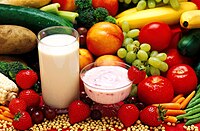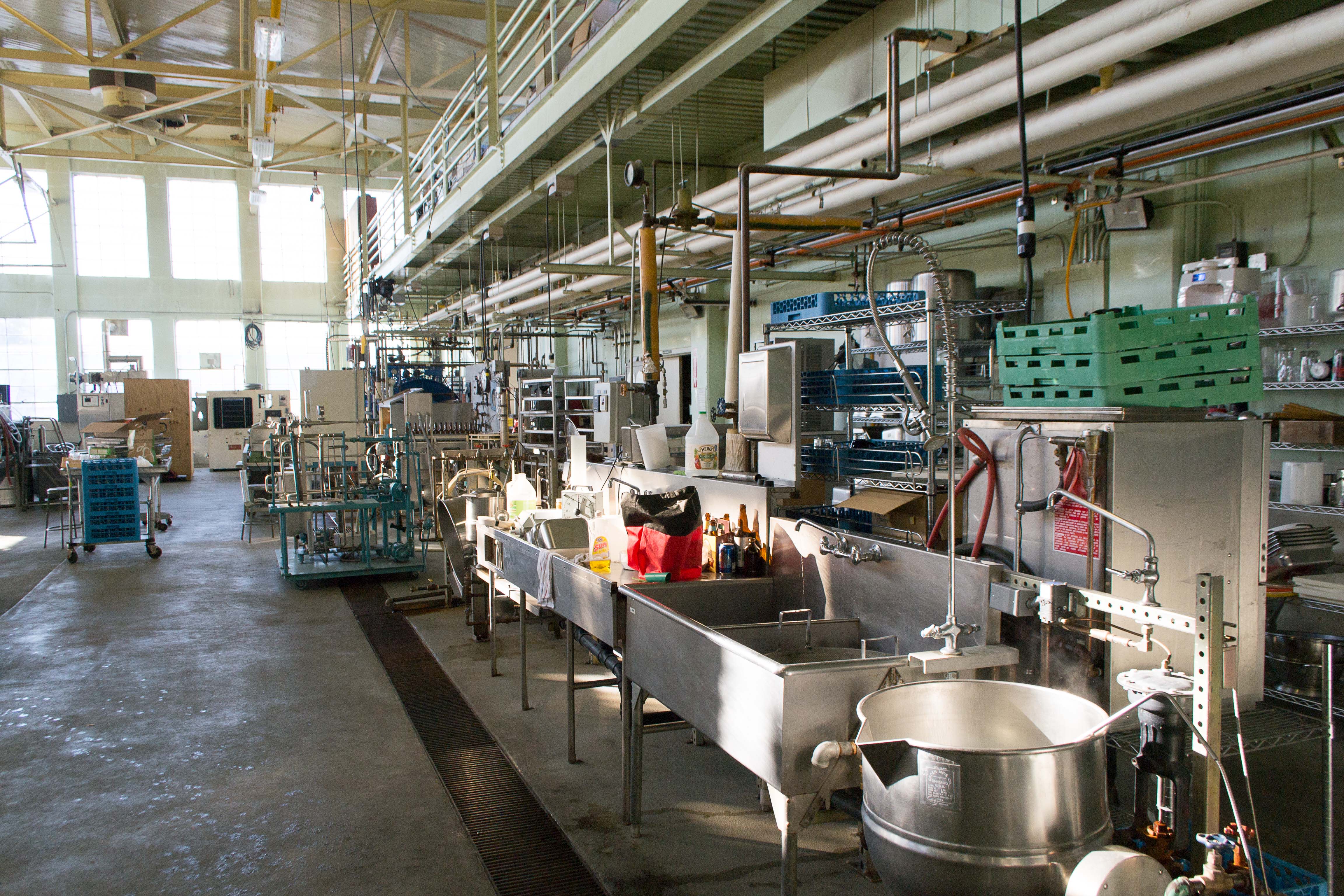
Fermentation of soymilk by Lactobacillus acidipiscis isolated from Chinese stinky tofu capable of efficiently biotransforming isoflavone glucosides to dihydrodaidzein and dihydrogenistein.
Sign Up to like & getrecommendations! Published in 2022 at "Journal of the science of food and agriculture"
DOI: 10.1002/jsfa.12087
Abstract: BACKGROUND The soy isoflavone microbial metabolites dihydrodaidzein (DHD), dihydrogenistein (DHG), equol and 5-hydroxy-equol, are generally more biologically active than their precursors, daidzein and genistein. Bacteria responsible for isoflavone metabolism have been isolated and identified. Fermented… read more here.
Keywords: hau fr7; isoflavone glucosides; lactobacillus acidipiscis; soymilk ... See more keywords

Viscosity of evaporated soymilk prepared in the laboratory using normal and 11S-lacking soybean seeds.
Sign Up to like & getrecommendations! Published in 2022 at "Journal of the science of food and agriculture"
DOI: 10.1002/jsfa.12288
Abstract: BACKGROUND Soymilk is utilized not only as a beverage but also as an alternative of bovine milk such as yoghurt and cream. Evaporated soymilk is expected to be utilized as condensed milk. Raw and heated… read more here.
Keywords: globulin; viscosity; prepared laboratory; evaporated soymilk ... See more keywords

Effect of transglutaminase on rennet-induced gelation of skim milk and soymilk mixtures.
Sign Up to like & getrecommendations! Published in 2019 at "Journal of the science of food and agriculture"
DOI: 10.1002/jsfa.9375
Abstract: BACKGROUND Protein gels made from cow milk and soymilk can yield products of exceptional value. Transglutaminase (TG) affect rennet-induced gelation of proteins, and improves the functionality of the final products. In this paper, TG and… read more here.
Keywords: soymilk; rennet induced; milk soymilk; induced gelation ... See more keywords

Protein aggregation and Ca2+-induced gelation of soymilk after heat treatment under slightly alkaline conditions
Sign Up to like & getrecommendations! Published in 2021 at "Food Hydrocolloids"
DOI: 10.1016/j.foodhyd.2021.107274
Abstract: Abstract Alkaline heat treatment of soymilk is widely used in the production of soy products. This study aimed to clarify the effect of the thermal aggregation state of proteins on the coagulation characteristics of soymilk.… read more here.
Keywords: heat treatment; aggregation; gelation; soymilk ... See more keywords

What is lost in translation: A cross-cultural study to compare the concept of nuttiness and its perception in soymilk among Korean, Chinese, and Western groups.
Sign Up to like & getrecommendations! Published in 2018 at "Food research international"
DOI: 10.1016/j.foodres.2017.12.002
Abstract: Cross-cultural communication of "nuttiness" can be problematic because the underlying conceptual elements and words used to describe its features may be largely culture-dependent. The present study was conducted to understand similarities and dissimilarities in the… read more here.
Keywords: soymilk among; cross cultural; perception; soymilk ... See more keywords

Improving the survival of Lactobacillus plantarum NRRL B-1927 during microencapsulation with ultra-high-pressure-homogenized soymilk as a wall material.
Sign Up to like & getrecommendations! Published in 2021 at "Food research international"
DOI: 10.1016/j.foodres.2020.109831
Abstract: Probiotic foods and supplements have been shown to offer multiple potential health benefits to consumers. Dried probiotic cultures are increasingly used by the food industry because they are easily handled, transported, stored, and used in… read more here.
Keywords: plantarum nrrl; ultra high; soymilk; nrrl 1927 ... See more keywords

Honey-mediated aggregation of soymilk proteins
Sign Up to like & getrecommendations! Published in 2020 at "Heliyon"
DOI: 10.1016/j.heliyon.2020.e03673
Abstract: Gluconic acid, the major organic acid in honey, is a partial hydrolysate of glucono-δ-lactone, typically used as a coagulant in preparing tofu. The present study aimed to examine the coagulation potential of five different types… read more here.
Keywords: honey; honey mediated; soymilk; concentration ... See more keywords

Recent innovations in processing technologies for improvement of nutritional quality of soymilk
Sign Up to like & getrecommendations! Published in 2021 at "CyTA - Journal of Food"
DOI: 10.1080/19476337.2021.1893824
Abstract: ABSTRACT Soymilk is well known for its health and nutritional benefits and is one of the best plant substitutes for cow milk. Soymilk is high in protein, low in cholesterol, lactose-free, and rich in polyunsaturated… read more here.
Keywords: recent innovations; bioactive compounds; nutritional quality; soymilk ... See more keywords

Composition, formation mechanism, and removal method of off-odor in soymilk products.
Sign Up to like & getrecommendations! Published in 2022 at "Journal of food science"
DOI: 10.1111/1750-3841.16370
Abstract: Soybean is a protein-rich material for plant-based products, and its application in soymilk products is limited due to its off-odor such as beany. In order to explore a solution to address this issue, composition, formation… read more here.
Keywords: formation mechanism; soymilk products; mechanism removal; composition formation ... See more keywords

Optimising Fermentation of Soymilk with Probiotic Bacteria
Sign Up to like & getrecommendations! Published in 2018 at "Czech Journal of Food Sciences"
DOI: 10.17221/97/2010-cjfs
Abstract: Božanic �R.,�Lovkovic �S.,�Jelicic �I.�(2011):�Optimisingfermentation of soymilk with probiotic bac - teria .�CzechJ.�FoodSci.,�29:�51-56. SoymilkwasfermentedwithprobioticcultureABT5�andyoghurtculturewiththeadditionofbifidobacteriaatdif- ferenttemperatures � (37°Cand � 42°C) � withtheaimofshorteningthefermentationtimeandproducingaprobiotic� fermentedsoymilk. �Duringthefermentationandstorageofthefermentedsoymilk �(28�daysat �+4°C), �thechangesin� pH-valueandviablecellscountwereobserved. �Incubationtemperaturedidnotaffectsignificantlyfermentationtime� (7�hat �42°Cand �8�hat �37°C, �respectively), �withABT5�culture �(Lactobacillus acidophilus,… read more here.
Keywords: optimising fermentation; soymilk probiotic; soymilk; probiotic bacteria ... See more keywords

Protective effects of synbiotic soymilk fortified with whey protein concentrate and zinc sulfate against bile duct ligated-induced hepatic encephalopathy
Sign Up to like & getrecommendations! Published in 2020 at "Gastroenterology and Hepatology From Bed to Bench"
DOI: 10.22037/ghfbb.v13i1.1750
Abstract: Aim: This study aimed to compare the effects of synbiotic soymilk fortified with whey protein concentrate and zinc sulfate with lactulose on bile duct ligated-induced HE. Background: Hepatic encephalopathy (HE) is seriously associated with neuromuscular… read more here.
Keywords: soymilk; ssm wpc; ssm; bile duct ... See more keywords